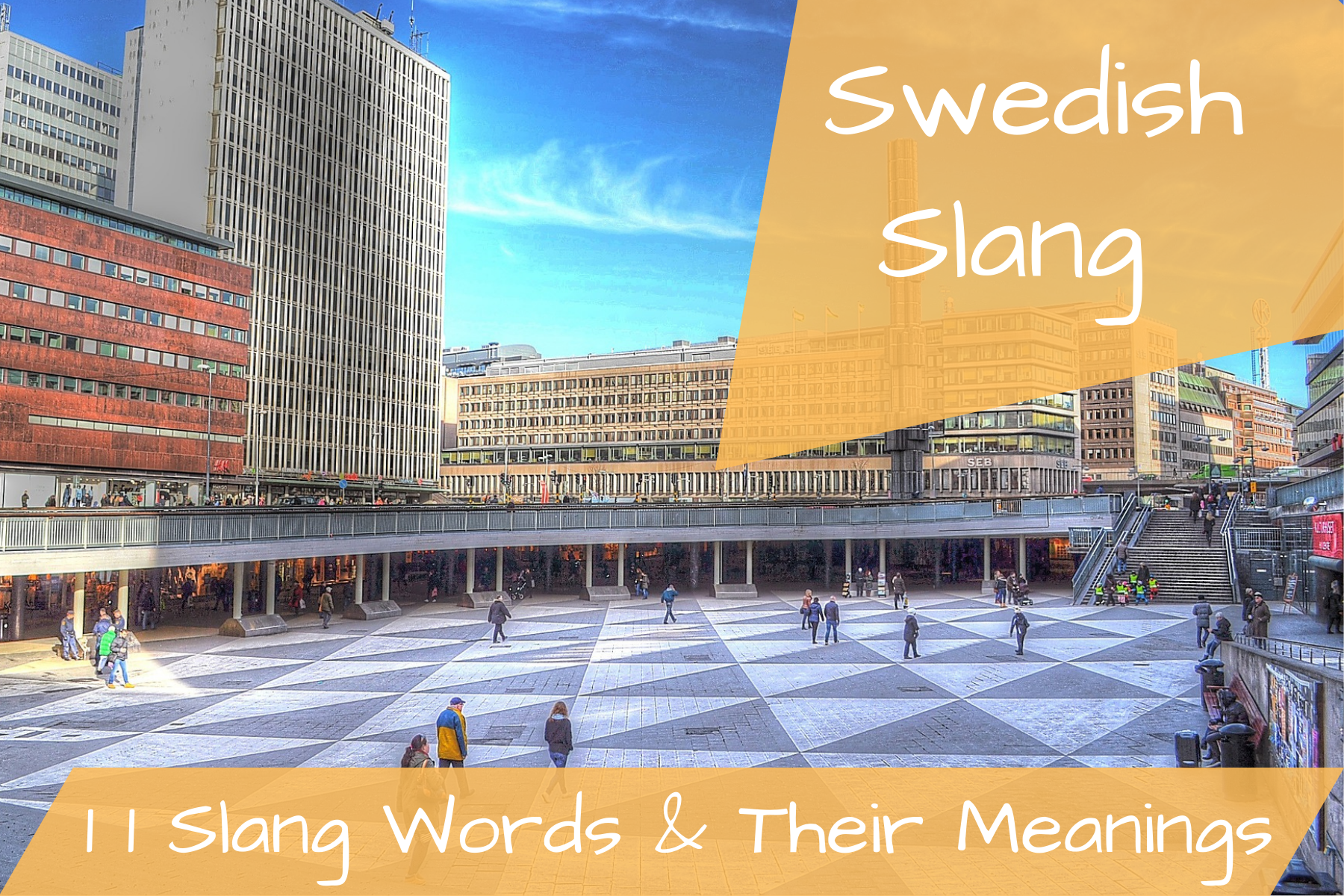11 Swedish Slang Words and Their Meanings Posted by Chelsea B on Apr 23, 2021 in Culture, Grammar, Slang, Swedish Language, Vocabulary
Mastering slang in your foreign language is not always smooth sailing. Use it well and you’ll impress native speakers. Use a word incorrectly and you risk being misunderstood, or maybe even embarrassing yourself a little bit… but wouldn’t you say that also just comes with the territory of navigating the deep waters of language learning? Today, I’ll list 11 Swedish words considered slang, from the “must-knows” to the Swedified English words, and through in some regional slang, too! Häng med!
Why study slang in your foreign language?
Slang is more than just keeping up with the teenagers. Slang is a benchmark of social change. As groups of people share experiences, they create new ways to talk about them. Studying slang in your foreign language gives you the opportunity to not only hang with the locals but also to connect in a shared experience. Slang varies a lot; each workplace, school, region, city, even neighborhood adopt different in-words and codes.
11 Swedish Slang Words
We’ll start with a few need-to-know words you’ll hear ALL the time, to the more obscure, and end with some regional slangord.
Beginner Slang
1. typ – “like”
Typ can mean “around/about”
Det fanns typ 30 personner på festen. There were around 30 people at the party.
But it also works as the dreadful equivalent of the slang usage of English “like.” Swedes sprinkle it anywhere an English speaker would insert “like.”
Hon sa typ att hon inte skulle hänga med och då blev jag typ jätteirriterad.
She said like that she wasn’t going to come and then I was like really annoyed.
It’s good to recognize typ, but be careful when adopting it, it’s easy to overuse and you don’t need it.
2. värsta – it means “the worst” but it’s used to refer to someone or something that is actually “the best.” “Johan är värsta fotbollsspelaren” means Johan is actually a great soccer player.
3. The prefix as- can be added to any adjective to give it a little extra kick.
Johan är asbra på fotboll. Johan is really good at soccer.
Swedified English Slang
This category is HUGE. Lots of Swedish slang comes from English and is adopted rather quickly thanks to the internet and social media. Nouns like “cringe” and the verb “to flex” are commonly used in Swedish slang, too!
As you have probably noticed in your Swedish study, it works out pretty well for English verbs to adopt a Swedish ending. For example, the English verb: “to exist” becomes existera in Swedish. Here are two more examples of låneord verbs from English that I’ve heard a lot lately:
4. att bonda → to bond, to connect with
bondar → bondade → har bondat
Det är inte så lätt att bonda med folk under coronatider.
It is not so easy to bond with people during the coronavirus.
5. att digga → to dig, as in “to like”
diggar → diggade → har diggat
Vad är det här för kaffe? Jag diggar det!
What kind of coffee is this? I dig it!
Slang I’ve Recently Learned:
6. att prella → to preliminarily decide something
prellar → prellade → har prellat
-När ska vi träffas? Klockan 3? -When should we meet? At 3 o’ clock?
-Ja, vi prellar klockan 3. -Yes, let’s say 3:00.
I heard this one for the first time the other day while messaging a friend. I quite like it!
7. stålers – this is a shortened version of the adjective “strålande” or “brilliant / stunning.” I’m told it’s used often by “hipster”-type folk in exclamation. “Stålers, Annika!”
Regional Slang
8. brillor – A quite common slangord that means “sunglasses.” But did you know in Stockholm they’re also called glajjor?
Är dina glajjor nya? Are your sunglasses new?
9. pjuks, also spelled pjux. Another Stockholmsslang term, this one means shoes or boots. It comes from the Swedish noun pläxja, “ski boot.”
10. att krabba can be used when something doesn’t end well or isn’t looking too good. Det krabbar is sort of like, “It’s done. It’s over.” This one is commonly heard in Småland, where I’ve spent a large amount of time learning my Swedish, so I had to include it.
krabbar → krabbade → har krabbat
Det krabbar för mig nu. It’s not looking good for me now.
11. Finlandsvenskt slang – Slang in Finland Swedish
Finlandssvenska is spoken by Finns whose native language is Swedish. Because I’m no expert in finlandssvenska, I did some research and found a quiz based on slang amongst young speakers. What does “Sluta flexa” och “Jag blir salty” mean? Take the quiz to find out! I got 8/12 correct, can you do better?
Quiz: Sluta flexa, jag blir salty – förstår du de trendiga slangorden?
How to Practice Slang
Diversify your sources. Different speakers use different vocabulary, so keep a variety of target language materials in your rotation. Podcasts and interview format shows are great for this. Check your work. The best resource I’ve found for Swedish slang is http://www.slangopedia.se/ It provides definitions, origins, and example sentences. Click “slumpa” in the upper lefthand corner of the site to shuffle to a random slangord.
Remember that slang depends a lot upon context. The slang I’ve above will differ from region to region and speaker to speaker, but that’s the fun part! Don’t be afraid to ask folks around you for clarification if there’s a word you are curious about. I’ve found that Swedes are quite happy to try and explain nuanced language like slang.
I’ve stopped at 11 words this week but there are mountains of Swedish slang to explore. Do you have a favorite Swedish slangord? Share it in the comments below!

Build vocabulary, practice pronunciation, and more with Transparent Language Online. Available anytime, anywhere, on any device.




